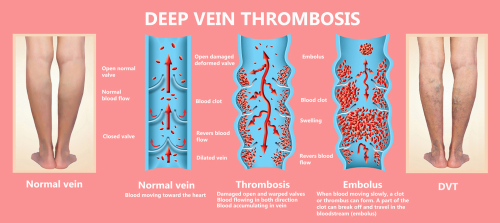When it comes to your health, it’s essential to be informed and understand what risks you’re prone to, and this is never more true than when you’re pregnant. Pregnancy puts a woman’s body under an immense amount of strain, in particular, the venous system. Unfortunately, this additional pressure can make DVTs more likely. For tips on prevention, here is some information on understanding thrombosis and DVT when pregnant.
What are thrombosis and DVT?
Thrombosis (which is the forming of blood clots, especially in the deeper veins in your legs) is more likely to occur in women who are pregnant. While it’s not common during pregnancy, there is still the risk, especially if you have other factors such as:
- Family history of blood clots
- Obesity
- Carrying twins or multiple babies
- Being over 35 years old
- If you smoked prior to the pregnancy
- Recent serious injury (e.g. broken leg) or severe infection
- Serious varicose veins, such as veins that are painful, above the knee or causing redness and swelling
- Having a caesarean
- Having had fertility treatment
The particular type of thrombosis most common in pregnancy is known as DVT (Deep Vein Thrombosis). If a DVT is unaddressed, it is at risk of causing a pulmonary embolism (PE), which is when the blood clot dislodges and moves to the lungs, which can often be fatal. While this might be the worst-case scenario, it’s important to know, and by following some simple steps, you can greatly reduce the chances of it developing.
Learn more: Varicose Veins and Pregnancy: everything you need to know.
Thrombosis & DVT when pregnant, is it preventable?
There are a few easy things that you can do to minimise the risk of developing DVT or any other vein issues in your legs, whether it’s during pregnancy or afterwards.
Pregnancy-safe exercises: Many exercises are still suitable for pregnant women, and it’s best to keep active consistently, rather than pushing hard now and then. To make sure the activity is safe for you and your unborn child, it’s best to avoid anything which has you lying on your back, requiring balance, or jumping up and down.
Squats, side leg raises and gentle lunges: Keeping your feet active while you’re seated with stretches and rotation exercises of the feet and ankles is a great way to keep the blood flowing even when you’re seated.
Compression stockings: Wearing medical-grade compression stockings both during and after pregnancy will not only reduce the risk of DVT but also work to speed up your recovery from swelling and vein stress from pregnancy. Compression stockings are best worn during travel in planes and cars, and when seated or standing for extended periods.
Lifestyle: There is a range of lifestyle factors that help with vein health for anyone, pregnant or not. Some key things to do to give your veins, body, and your unborn baby the best health care:
- Quit smoking (speak to your GP to find the best way for you).
- Eat healthy, reducing fat and sugar and focusing on fruit and vegetables.
- If you’re obese, lose weight in a sustainable manner, by following the CSIRO well-being diet, as well as low-impact exercise.
Treatment options
If you’ve already developed DVT while pregnant, there are some simple ways to treat it to prevent it from getting worse and potentially harming you and your child. Speaking to your GP or another doctor, they’ll refer you to a haematologist (blood specialist) who will then prescribe you a course of blood-thinning medication to stop the clot from getting bigger while helping it to dissolve and minimise the risk of further clots.
Unless there are serious complications (which are very unlikely), your unborn child won’t be affected by this treatment, and in the large majority of cases, women who develop these clots go on to have happy healthy births.
Seek expert advice
The doctors at The Vein Institute specialise in varicose vein treatment. We offer patients a comprehensive program using non-surgical laser treatment techniques. You can learn more in our Definitive Guide to Varicose Vein Treatment.
The benefits of non-surgical varicose vein treatment are:
- Walk-in walk-out treatment
- 98% success rate
- Extremely effective
- Can be performed at a clinic (no hospitalisation)
- No general anaesthetic
- Medicare rebates apply
- No downtime or time away from work
Call us on 0420 102 637, or fill out our booking request form.



